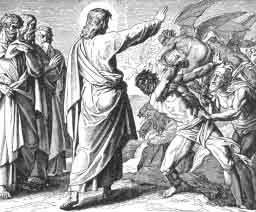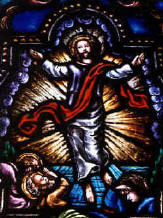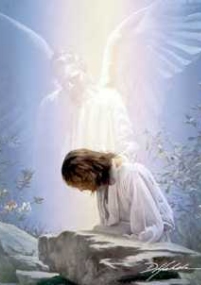Confronting the Other Side
We notice right away in the Gospel (Mt 8:28-9:1) that Jesus leaves the holy land to go to the unholy land. That is, He goes beyond the boundaries of Israel into pagan Gentile territory, the “other side.” Geographically, this simply means the other side of the Sea of Galilee, but spiritually it means the dark side, their side rather than our side, the habitation of evil spirits and of all that is unclean and opposed to God.
Sure enough, as soon as Jesus arrived on the “other side,” He was met by two men who were possessed by demons. Lots of them. Enough to fill a large herd of swine. The swine, by the way, also belonged on the “other side,” because they were considered unclean, and no Jew was permitted to make use of them for food or anything else.
The demoniacs lived among the tombs, St Matthew tells us. That is, they lived on the “other side” of life, in the place of death and corruption. In the Gospel of John, Jesus describes the devil as a “murderer from the beginning,” as one who comes only to “slaughter and destroy.” So it is fitting that those whom he possesses would not embrace the abundant life that Jesus came to give, but would dwell only in the shadowy realm of death and decay.
Was this simply the preference of these unfortunate men—an alternative lifestyle, perhaps? Did it work for them? They don’t seem to have been very happy and fulfilled, much like those people today who follow the devil’s seductions but in the end reap only misery, emptiness, and degradation. In fact, the Gospel said they were quite fierce, full of rage, and so no one wanted to be near them, which only exacerbated their lonely misery.
were quite fierce, full of rage, and so no one wanted to be near them, which only exacerbated their lonely misery.
They tried to torment others, for the demons urged them to do so, but when the Son of God entered their dark and angry domain, they were thrown into confusion. Suddenly they felt like they were being tormented—by this Man of Peace who quietly strode toward them. They realized then who He was. They knew it even before Jesus’ own disciples knew it. In the episode immediately preceding this one, in which Jesus and the disciples were actually making the crossing to “the other side,” Jesus calmed a storm (perhaps whipped up by the devil, in order to prevent Jesus from coming to conquer him?). The disciples didn’t know what to make of it and wondered who this man could be, whom even the winds and sea obeyed. The demons knew and shouted it out in their mad rage: The Son of God! “What have you to do with us, O Son of God? Have you come here to torment us before the time?”
What is “the time”? St Peter and St Jude tell us: “God did not spare the angels when they sinned but cast them into hell… kept by him in eternal chains in the nether gloom until the judgment of the great day” (2Pet. 2:4; Jude 6). We learn from St Luke’s parallel account of the demoniacs that they were bound with chains as well as lived in the tombs. So there’s a kind of projection into the visible, material world of what was happening in the invisible world. The demons are bound with spiritual chains in the nether gloom of Hell, so when they possess these men on earth, the men are bound with earthly chains and live in the gloom of the tombs. Back to “the time,” though, that is the “judgment of the great day,” when the fallen angels and all the damned will enter upon their definitive and everlasting torment. Now the demons are still allowed to roam around the earth, where it seems that they don’t suffer quite as much. That becomes clearer in Luke’s account, when he relates that the demons begged Jesus not to send them back to the abyss, but rather into the swine. So even inhabiting pigs was less disgusting that dwelling in Hell! In effect they were saying to Jesus: “Hey, leave us be. We know we have to go back to Hell on judgment day, but let roam around here in the meantime. You are the Judge, the one who is going to declare our sentence at the end. Why are you here now? Don’t torment us before the time!”
Jesus was not interested in their plans or calculations, or their outraged sense of justice. They would have turned on Him in a second if He gave them half a chance, anyway. What Jesus was interested in was proclaiming and establishing his Kingdom, and preparing his people to embrace and enter it. The Gospels make it clear that in order for the Kingdom of God to be established, the anti-kingdom of satan has to be overthrown. The path has to be cleared, the rough ways made smooth, as the prophet announced. This is especially clear in Mark and Luke, in which Jesus’ very first miracle is the casting out of a demon. It is as if to say: The Christ has arrived and therefore the Kingdom of God is at hand. All uncleanness and evil must be banished and depart. The Kingdom of God will not share authority with the kingdom of satan.
Jesus also makes this clear when He says explicitly that his casting out of demons means that the Kingdom of God has come (see Mt 12:28). In a sort of allegory, Jesus refers to the devil as a “strong man” but to Himself as the “stronger man” who binds the strong man and plunders his goods. We see in today’s Gospel that the “strong man” had seized the souls of the two men and made them his possession. But the Stronger Man came on the scene, despoiled the strong man and recovered the souls of the two men for service in his own Kingdom. They went off proclaiming the wonders Jesus had worked for them.
The demons thought they were being crafty when they asked Jesus to send them into the swine. They may have thought: “OK, we have to leave these two guys, but the pigs aren’t so much worse. At least if we’re in the pigs we don’t have to go back to Hell.” They must have been momentarily surprised that Jesus actually permitted what they wanted. Imagine, the condemned demons asked a favor of their divine and just Judge, and He granted it! Maybe they then thought: “Hey, this guy is a pushover after all! All right, into the pigs we go!” Perhaps Jesus was suppressing a smile at the time, knowing that within a few minutes they would all indeed be right back in Hell, for even the pigs found them so loathsome that they would rather drown than host them for a moment!
The swineherds, however, were not privy to all this. They had no idea what was going on, except that they had just lost a year’s supply of bacon and ham. They were angry and indignant and asked Jesus to leave. Jesus had accomplished his mission by liberating the possessed men, restoring the image of God in them, and sending the demons back to Hell. But the “other side” remained the “other side” because the rest of the people, in St John’s words, preferred the darkness to the light. A great light had just shone on a people dwelling in darkness, but they did not wish to receive it. Their land remained the land of uncleanness and pagan unbelief and idolatry—until perhaps after Pentecost the Apostles brought the grace of the Holy Spirit to them. In our world today, the “other side” still exists, wherever the devil’s will is done. The saints cross over and do battle with the powers of darkness, to win souls for Jesus’ Kingdom.
The Gospel closes by saying that Jesus “crossed over and came to his own city.” Having crossed over to Hell, as it were, He came back to minister to the lost sheep of the House of Israel. We hear in the parable of the rich man and Lazarus that there is an uncrossable chasm between Heaven and Hell. Only Jesus can make that crossing. He first crossed the uncrossable chasm between Creator and creature by his Incarnation. While on earth He crossed over to unclean lands to deliver souls from the devil. When He died He descended to the “nether gloom” to rescue all the righteous souls who were longing for their Redeemer.
Today He wishes to cross over into the land of our hearts, our souls. What will He find: uncleanness, idolatry, unbelief, selfishness, sin? That is the devil’s kingdom that He has come to overturn and destroy. But since He has given us freedom, He waits for us to allow Him to come in and liberate us. We have to want it, to pray earnestly for it—as He taught us: “Your Kingdom come; deliver us from the evil one!” If we do not wish to be tormented when the time comes, the great day of judgment, now is the time to ask Jesus, once and for all, to enter our lives and hearts, to dwell and reign there and keep us safe and pure and holy. When we sin, we are like swineherds who ask Him to leave. Let us rather cling to Him, so that on that great and final day we may rejoice that the Kingdom of God has been victoriously and gloriously established, forever–and we are there!








